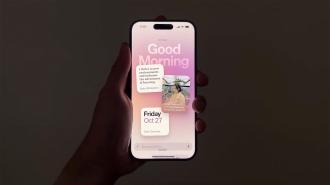Silicon Valley startup New Computer has unveiled Dot, an AI companion that could forever change our relationship with technology.
The challenge: It’s been just under one year since OpenAI released ChatGPT, the hugely popular app that introduced millions of people to “large language models” (LLMs): AIs trained to understand and generate human-like text.
Since then, the LLM hype train has been steadily plowing down the tracks, with seemingly everyone on board, from tech giants to fast food restaurants to ivy league colleges. For most of us, though, LLMs have yet to become an essential part of our lives.
“Through your conversations with it, Dot grows its knowledge bank of what is meaningful to you.”
New Computer
Introducing Dot: New Computer hopes to change that with Dot, an LLM-powered AI companion accessible through an iOS app.
“Dot by New Computer is an intelligent guide designed to help you remember, organize, and navigate your life,” the startup — cofounded by Samantha Whitmore, former head of engineering at Kensho, and Jason Yuan, a former member of Apple’s design team — writes on its website.
What’s that mean? While a chatbot like ChatGPT is similar to a teacher or assistant — you ask it a question, it responds with a (usually) factual answer — Dot is designed to be more like a devoted friend.
You can ask the AI straightforward questions, but you can also just share information about yourself with it — from your work schedule to memes you find funny — and it’ll try to use the information to enhance your life.
Unlike ChatGPT, Dot won’t forget what you told it as soon as you close the app, either.
“Through your conversations with it, Dot grows its knowledge bank of what is meaningful to you, piecing together elements in your life to help you make sense of the bigger picture,” writes New Computer.
Fast Company’s Mark Wilson, who was granted early access to New Computer’s AI companion, describes how it sent him information on Korean architecture after it found out he was going to visit the nation.
Dot also sent him recipes it thought he might like based on meals he’d made, and even followed up later to ask if he’d tried them.
“[Dot feels like] a reminder engine, a search buddy, an efficiency expert, an infinite storehouse for emotional labor. A pool floaty for your mental health. A thing that’s ideally thinking for you even when you’re asleep,” Wilson wrote.
Looking ahead: Like other LLMs, Dot can make mistakes, and its unprompted “gifts” can get annoying, according to Wilson. Still, he seems hooked on the AI companion, saying that after just three weeks of using it, it was “already about impossible” to imagine life without Dot.
Of course, this is just one person’s experience, but it shouldn’t be long before we see how others feel about Dot — New Computer is now beta testing the app (you can join the waitlist) and expects to release it before the end of 2023, likely with a monthly subscription fee.
“Though we are still early on this journey, we are committed to building a product that feels like the future is finally here,” writes New Computer.
We’d love to hear from you! If you have a comment about this article or if you have a tip for a future Freethink story, please email us at [email protected].






